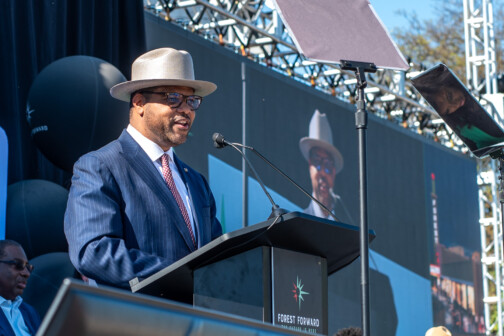In some of Dallas’ more vulnerable communities, Dallas-based MD Medical Group is innovating to improve their care in a COVID-19 world. Around the country and in Dallas, poor communities are more likely to end up in the hospital due to coronavirus, and MD’s clinics are positioned in many of these vulnerable communities. It was one of the first groups to offer private drive-thru testing, and now is offering free testing as well. But the community still faces a variety of changes.
As elective procedures ended and people started staying home, all practices saw a dip in business, but MD rapidly pivoted to COVID-19 testing and treatment. The clinics have only seen a 17 percent dip in business since stay-at-home was imposed, which is much better than most clinics. “We had to mobilize to understand what our role could and should be, says MD Medical Group CEO Alvaro Saenz.
The clinics see a higher portion of Medicaid patients and the clinics serve neighborhoods that are less affluent, meaning the clinics had to be innovative to remain in business. Before COVID-19, telehealth had not been reimbursed for Medicaid patients, but that restriction was waived as the virus spread. MD also accelerated the development of their virtual care app to be ready when it would be most relevant. Both measures have had an impact on the clinics, who are continuing to run a full staff.
When the drive-thru sites first opened, Saenz said they would see around a dozen people get tested who saw it as they drove past the clinic, but by the second day there would be 50-70 patients there to get tested. Statewide, MD has tested 4,000 patients, and seen around 300 positive cases in its 14 testing sites.
The patients MD sees are more likely to have underlying conditions that would make a COVID-19 infection more serious, like hypertension, diabetes, and COPD. To care for that vulnerable population, MD decided to make some unorthodox moves on how and where they delivered treatment.
In order to accommodate those who didn’t want to be exposed to COVID-19 but still needed treatment, MD began instituting a curbside care system where they would have the appointment more or less at the patient’s vehicle, similar to how restaurants are bringing food right to the car. “We are literally meeting the patient where they are,” Saenz says.
In addition to curbside care, MD has flipped the script on its call centers that usually receive calls from those with health issues, and the callers are now reaching out to the groups most vulnerable patients with underlying conditions, making sure they are well and have what they need. “Whatever their needs are, we want to fill them in some way,” Saenz says.
This is all part of MD’s engagement strategy and transition to value-based care, which hopes to catch health problems upstream before they become urgent, expensive hospitalizations. Saenz says payers are interested in learning more about the model, as it saves money for the system and individuals, though it requires more work on the front end with care coordination and patient engagement. “How do we move to something else that is one step closer to risk and is beneficial to patient and system?” Saenz says.
While the pandemic has certainly been costly in a number of ways, Saenz is hopeful that a move toward value-based-care will be better for everyone, but especially the most vulnerable and costly patients who need more integrated and coordinated care. “It is the perfect catalyst to take us to the next step,” he says.





